Legal Letter Of Advice To Client
Dear [Client's Name],
RE: Legal Advice
I hope this letter finds you well. I am writing to provide you with legal advice regarding the matter we discussed during our recent meeting. As your legal counsel, my goal is to guide and assist you in making informed decisions that protect your rights and interests.
[Give a brief overview of the matter and the background information discussed with the client.]
After carefully reviewing the facts and relevant laws, I would like to offer the following advice:
1. **Legal Assessment:** Based on the information provided, it appears that [state your initial assessment of the client's legal position]. However, it is crucial to conduct further research and investigation to obtain a comprehensive understanding of the matter.
2. **Options and Strategies:** There are several potential courses of action that we can pursue to achieve your desired outcome. These may include [list possible legal options and strategies]. Each option has its benefits and risks, and I recommend discussing them thoroughly to determine the most suitable approach.
3. **Potential Risks:** It is essential to be aware of the potential risks involved in pursuing any legal action. These risks may include [mention potential risks or challenges that may arise during the process].
4. **Alternative Dispute Resolution:** Depending on the nature of the matter, it may be beneficial to explore alternative dispute resolution methods, such as mediation or negotiation, to achieve a swift and cost-effective resolution.
5. **Documentation and Evidence:** Collecting and preserving relevant documentation and evidence can significantly strengthen your position in any legal proceedings. Please ensure that you gather all relevant documents and provide them to us as soon as possible.
6. **Legal Costs:** Engaging in legal proceedings may involve expenses such as court fees, attorney fees, and other related costs. I will provide you with an estimate of the potential costs associated with each option we discuss.
7. **Timelines:** It is important to be aware that legal proceedings may involve certain timelines and deadlines. I will keep you informed about any critical dates to ensure compliance with legal requirements.
8. **Confidentiality:** Our discussions and all information you share with me are protected by attorney-client privilege, ensuring strict confidentiality.
Please remember that this letter serves as legal advice and is intended solely for your use. It should not be shared or relied upon by any third party without my prior written consent.
If you have any further questions or concerns, please do not hesitate to contact me. I am here to address any uncertainties you may have and to work with you to achieve the best possible outcome in your case.
Thank you for entrusting me with your legal matters. I look forward to assisting you further.
Sincerely,
[Your Name]
[Your Title/Position]
[Law Firm Name] (if applicable)
Formal Legal Advice Letter Regarding Contractual Dispute
Subject: Legal Advice Regarding Your Contractual Dispute
Dear [Client Name],
Following our consultation regarding the contractual dispute with [Other Party], I have reviewed the relevant documents and applicable law. Based on the facts presented, it appears that [describe the legal issue and applicable statute or regulation].
I recommend the following course of action:
1. Attempt an amicable settlement with [Other Party] through written communication.
2. Prepare and file any necessary documentation within the statutory deadlines.
3. Consider mediation or arbitration before resorting to litigation.
Please review the attached detailed memorandum outlining potential risks, benefits, and anticipated outcomes. Should you have any questions or require clarification, do not hesitate to contact me.
Sincerely,
[Your Name]
[Law Firm Name]
Preliminary Legal Advice Letter on Property Matter
Subject: Preliminary Advice on Property Transaction
Dear [Client Name],
This letter provides preliminary advice based on our recent discussion regarding the purchase of [Property Address]. Initial review of the title documents, zoning regulations, and related agreements suggests that the transaction is generally compliant with current legal requirements.
However, further investigation is required on [specific issues, e.g., encumbrances, easements]. I recommend proceeding with a detailed due diligence report before finalizing the transaction.
Please contact me to schedule a meeting for comprehensive review and next steps.
Kind regards,
[Your Name]
[Law Firm Name]
Legal Advice Letter on Employment Issue
Subject: Advice Regarding Employment Termination
Dear [Client Name],
Following your inquiry about the recent termination from [Company Name], I have analyzed the employment contract and applicable labor law. Based on the information provided, there may be grounds to contest the termination due to [reason, e.g., lack of notice, discrimination].
Recommended steps include:
1. Gather all relevant documentation and correspondence.
2. Consider sending a formal demand letter for reinstatement or compensation.
3. Explore filing a claim with the appropriate labor authority if settlement is not feasible.
Please review the attached document for a detailed assessment and let me know how you wish to proceed.
Sincerely,
[Your Name]
[Law Firm Name]
Legal Advice Letter Regarding Litigation Strategy
Subject: Strategic Legal Guidance for Pending Litigation
Dear [Client Name],
I am writing to provide guidance regarding the litigation matter against [Opposing Party]. After thorough review of case documents and applicable precedents, I recommend a multi-step approach focusing on early settlement discussions while preparing for trial contingencies.
The strategy includes:
- Filing necessary motions promptly.
- Engaging in alternative dispute resolution if beneficial.
- Maintaining comprehensive documentation for evidentiary support.
Attached is a detailed timeline and risk assessment for your consideration.
Best regards,
[Your Name]
[Law Firm Name]
Informal Legal Advice Letter on Business Compliance
Subject: Quick Advice on Regulatory Compliance
Hi [Client Name],
Following your recent questions regarding compliance with [specific regulation], here’s a summary of my advice:
- Ensure your business filings are current.
- Review internal policies to align with legal standards.
- Maintain accurate documentation for inspections or audits.
Let me know if you’d like a full written opinion or just a quick follow-up session.
Cheers,
[Your Name]
[Law Firm Name]
Provisional Legal Advice Letter Regarding Intellectual Property
Subject: Provisional Advice on Intellectual Property Protection
Dear [Client Name],
This letter provides provisional advice concerning your intellectual property rights related to [Invention/Work]. Based on initial review, your IP appears protectable under [relevant law], but additional documentation and filing procedures are required.
Immediate recommendations include:
1. Maintain confidential records of development.
2. Prepare provisional patent or copyright applications.
3. Conduct a clearance search to ensure no infringement exists.
Please note that this advice is preliminary, and final recommendations will follow upon comprehensive review.
Sincerely,
[Your Name]
[Law Firm Name]
Formal Legal Advice on Debt Recovery
Subject: Guidance on Debt Recovery Action
Dear [Client Name],
Following your request for advice on recovering outstanding debts from [Debtor Name], I have evaluated the contractual obligations and legal options. The recommended course includes:
- Sending a formal demand letter outlining the debt and consequences of non-payment.
- Considering negotiation or mediation before initiating court proceedings.
- Filing a claim within the statutory limitation period if settlement fails.
Attached is a detailed plan of action and timeline.
Sincerely,
[Your Name]
[Law Firm Name]
What / Why: Purpose of a Legal Advice Letter to Client
- Provides formal guidance on legal matters.
- Helps clients understand risks, options, and obligations.
- Serves as an official record of professional advice.
- Facilitates informed decision-making and protects client interests.
Who Should Send a Legal Advice Letter
- Licensed attorneys or law firms representing clients.
- Legal consultants providing specialized guidance.
- In-house counsel for corporate clients addressing internal legal matters.
Whom the Legal Advice Letter Should Be Addressed To
- Individual clients seeking advice on personal or business legal matters.
- Corporate clients requesting formal recommendations.
- Trustees, estates, or organizations requiring legal guidance for decision-making.
When to Send a Legal Advice Letter
- After initial consultation or receipt of client instructions.
- When legal research or document review is complete.
- Prior to litigation, contract execution, or regulatory submissions.
- When clients need written confirmation of oral advice.
How to Write and Send a Legal Advice Letter
- Assess the legal issue thoroughly and gather all relevant information.
- Determine the scope of advice and level of formality.
- Draft a clear, structured document addressing key points.
- Use formal language for official letters; email may be used for preliminary or quick advice.
- Include attachments, citations, or appendices as necessary.
Formatting Guidelines
- Length: Typically 1–3 pages depending on complexity.
- Tone: Formal, professional, precise, and objective.
- Structure:
- Subject line indicating purpose.
- Salutation to the client.
- Introduction summarizing purpose and context.
- Detailed analysis and recommendations.
- Conclusion with suggested next steps.
- Closing and signature of attorney.
- Attachments: Supporting documents, research, or forms.
Requirements and Prerequisites
- Complete factual information from the client.
- Copies of contracts, agreements, or relevant documents.
- Understanding of applicable laws, regulations, and precedent cases.
- Confirmation of engagement and scope of legal services.
Tricks and Tips for Legal Advice Letters
- Use headings and bullet points for clarity.
- Avoid ambiguous or speculative language.
- Reference laws, statutes, or case law to support recommendations.
- Clearly differentiate between provisional and definitive advice.
- Ensure compliance with confidentiality obligations.
Common Mistakes to Avoid
- Providing incomplete or speculative advice without proper facts.
- Using casual language that undermines authority.
- Failing to document disclaimers for preliminary advice.
- Omitting next steps or client responsibilities.
- Neglecting proper legal citations or references.
Elements and Structure of a Legal Advice Letter
- Subject line stating the issue.
- Salutation to client.
- Introduction summarizing context and instructions received.
- Detailed body with analysis, references, and recommendations.
- Conclusion suggesting actions or decisions.
- Closing with attorney signature and firm details.
- Attachments or appendices supporting analysis.
After Sending / Follow-up Actions
- Confirm receipt by client, especially for critical matters.
- Schedule follow-up meetings or calls to discuss next steps.
- Update internal case files with issued advice.
- Monitor compliance or implementation of advice where applicable.
Pros and Cons of Sending Legal Advice Letters
Pros:
- Provides formal documentation of advice.
- Protects both attorney and client legally.
- Clarifies complex legal issues in writing.
Cons:
- May incur additional time and cost for detailed letters.
- Risk of misinterpretation if language is not clear.
- Requires careful attention to confidentiality and privilege.
Compare and Contrast: Legal Advice Letter vs Oral Advice
-
Legal Advice Letter:
- Permanent record for client reference.
- Supports due diligence and compliance obligations.
- Can be referenced in future disputes or litigation.
-
Oral Advice:
- Faster and less formal.
- May not provide the same level of protection or clarity.
- Suitable for quick consultations or clarifications.
FAQ
Q: Can a legal advice letter be sent via email?
A: Yes, especially for preliminary or quick advice, but sensitive matters may require formal letter delivery.
Q: Does the client need to acknowledge the letter?
A: It is recommended to confirm receipt, especially for critical advice.
Q: Are disclaimers necessary?
A: Yes, especially for provisional or preliminary advice to limit liability.
Q: Can a legal advice letter be used in court?
A: It may serve as evidence of advice given, but attorney-client privilege must be maintained.
Does it require attestation or authorization
- Legal advice letters generally require the signature of the licensed attorney issuing the advice.
- For corporate clients, may require authorization from the law firm or compliance with internal policies.
- Notarization is usually not required unless explicitly requested for specific purposes.

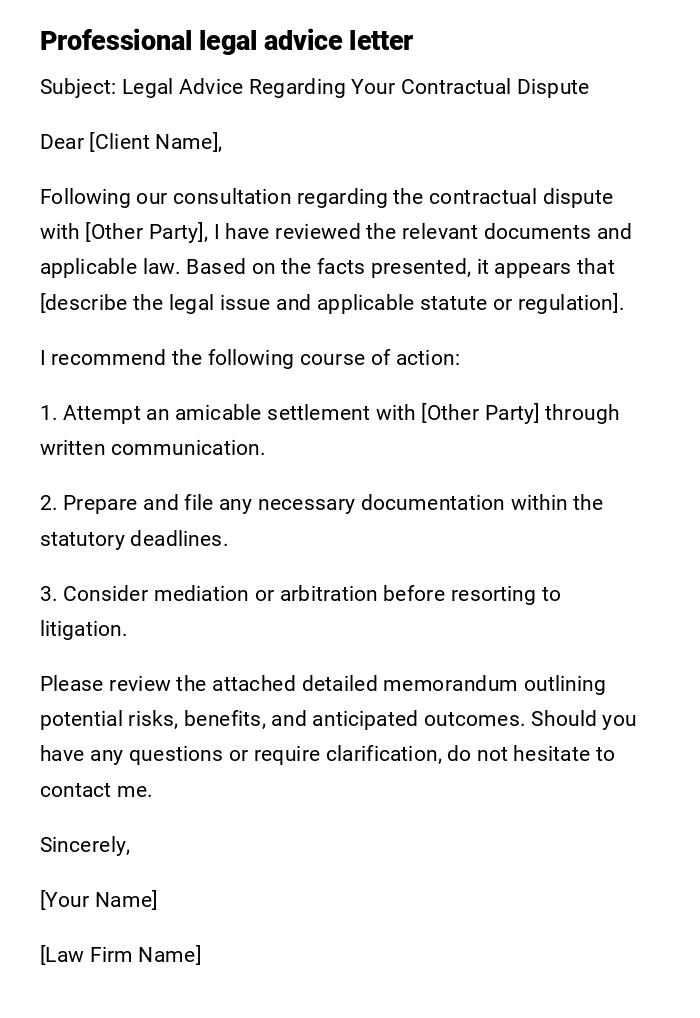
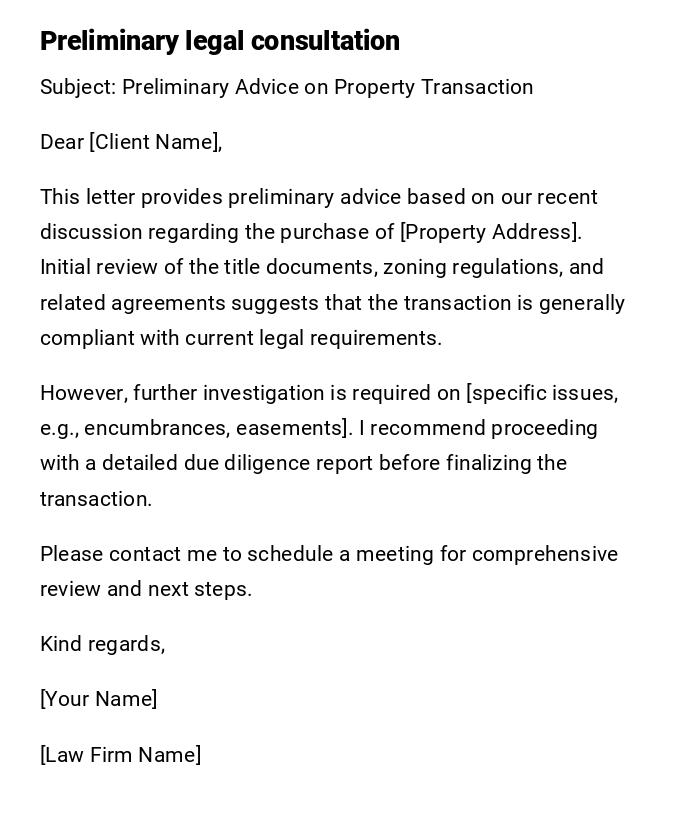
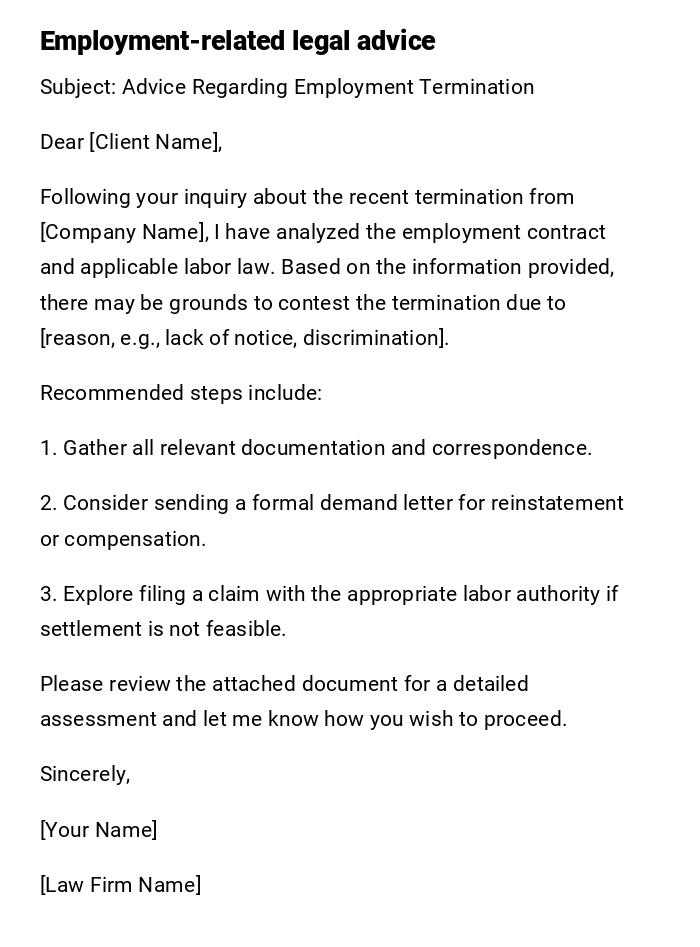
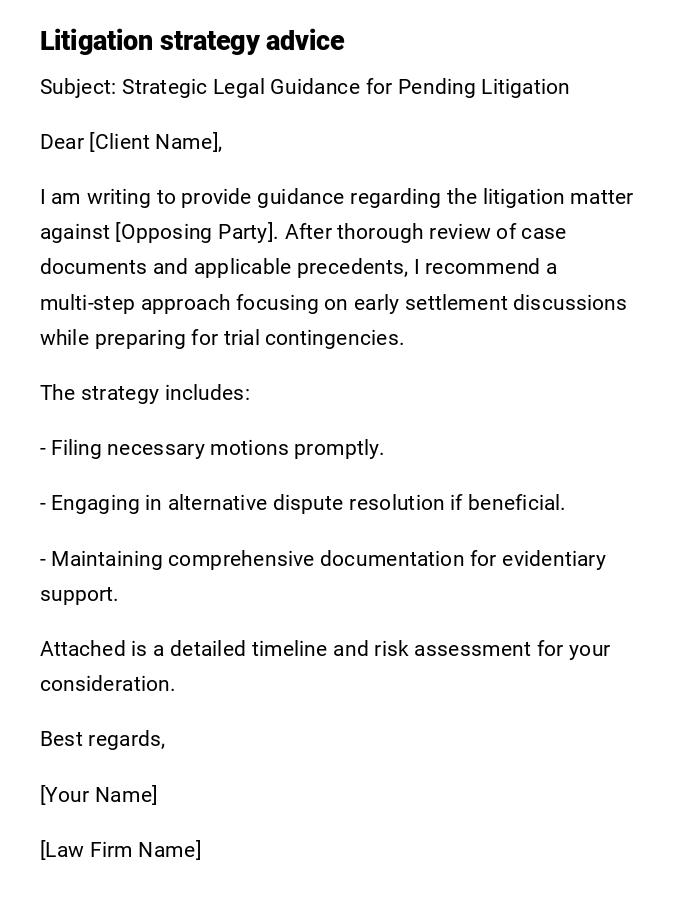
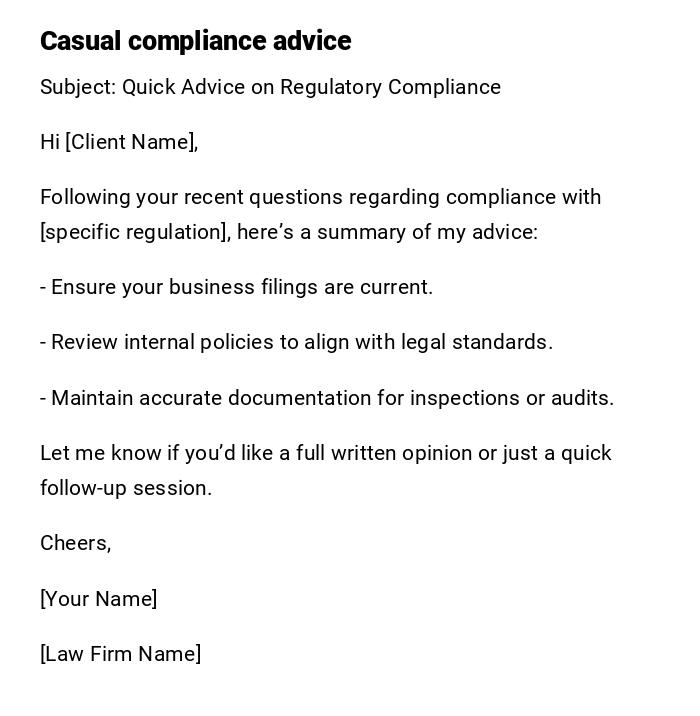
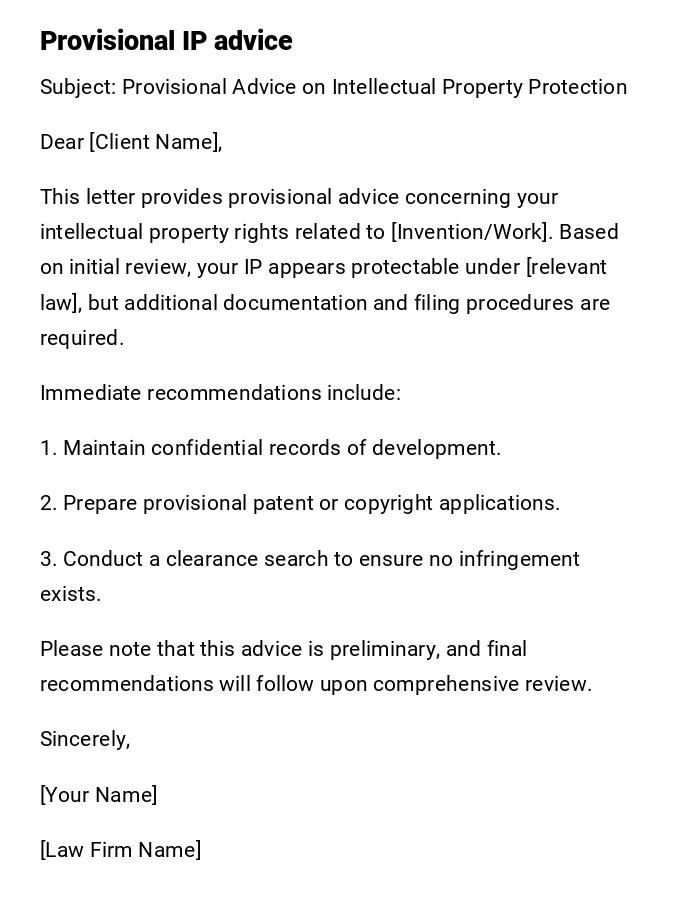
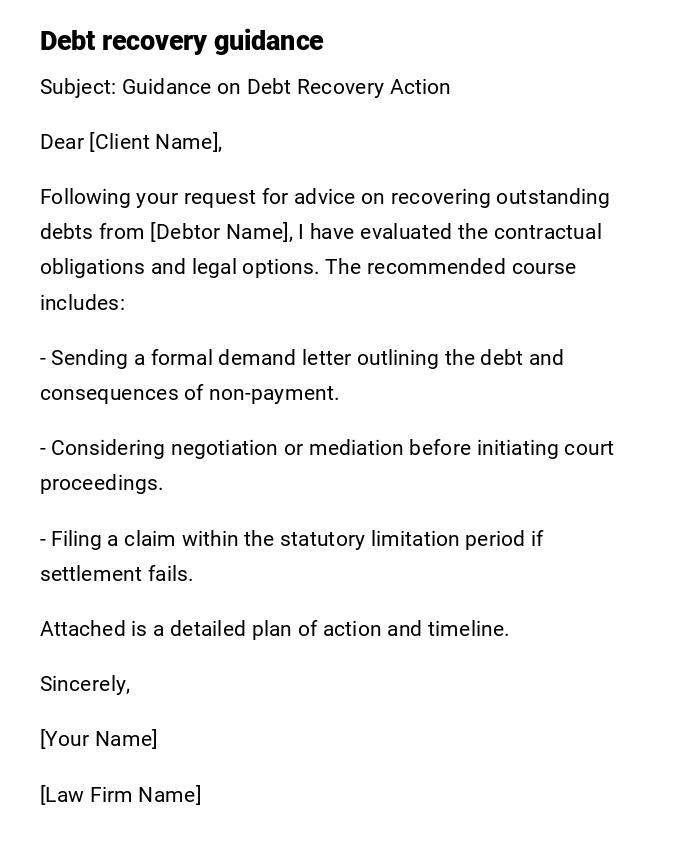

 Download Word Doc
Download Word Doc
 Download PDF
Download PDF